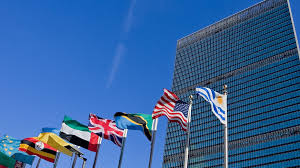Statement by Anna Evstigneeva, Deputy Permanent Representative of Russia to the UN, at the open VTC of UNSC members on Central Africa
Mr. President,
We thank Special Representative of the Secretary-General François Louncény Fall for a comprehensive briefing. Russia unfailingly supports the activity of UNOCA – United Nations Regional Office for Central Africa, which is an effective tool of preventive diplomacy. We see that SRSG’s good offices are in high demand in this sub-region.
Central African countries are dealing with complex challenges. This year added another one to this set – COVID-19 pandemic. It is fundamentally important that timely measures were taken to curb the spread of the virus.
We are convinced that regionals have a key role to play in crisis prevention and conflict settlement. We welcome the achievements of the Economic Community of Central African States (ECCAS) in terms of conducting an institutional reform that should strengthen capacities of the organization. We hope that UNOCA will set forth its fruitful interaction with ECCAS.
Mr. President,
Central African region is crucial from the viewpoint of countering the spread of terrorism on the continent. We are worried that the destructive potential of “Boko Haram” is not abating. Chad and Cameroon suffer a lot from its terrorist attacks. We attach special importance to the regional efforts that develop coordinated approaches to combating this threat. For that purpose, it is crucial to ensure that there is predictable financing for the Multinational Joint Task Force (MNJTF)
On our part, we stand ready to continue engaging in various formats aimed at overcoming the terrorist threat on the African continent.
Mr. President,
We keep close track of the developments in the Central African Republic. We welcome efforts of President Touadera to stabilize the situation in the country, which is especially important in view of the pending elections. The political agreement on peace and reconciliation in the CAR of 6 February 2019 is working: it provides the basis for long-term settlement in the country. Russia will continue to closely follow the process of national reconciliation, coordinating efforts with those who are involved in searching for ways to normalize the situation.
Among other instability factors in the Central African region there is piracy in the Gulf of Guinea. Unfortunately, villainous attacks on foreign marine vessels continue, including attacks that take hostages, with Russian nationals among them. On many occasions, our country participated in international efforts that counter this threat, including the efforts of the Contact Group on Piracy off the Coast of Somalia. We hope this expertise will help respond to similar challenges in the Gulf of Guinea.
We note the overall decrease in the activity of the “Lord's Resistance Army” (LRA). Hopefully, the AU-sponsored initiative on regional cooperation aimed at elimination of the LRA will turn out productive.
Mr. President,
We follow the developments in Cameroon. Its problem with Anglophone provinces is deeply rooted in the colonial era. Unfortunately, it is not the first time when we see that decisions taken in the interests of former colonial powers actually affect the situation in today’s independent states that have to be coping with such legacy. That is why all problems that have accumulated so far can only be solved at a negotiation table. All sides in Cameroon must act in a reserved manner and abstain from any forms of violence. Regional elections that convened on 6 December became an important step towards implementing the recommendations of the national dialogue. We hope this positive momentum will help normalize the situation.
In conclusion, we would like to emphasize that threats and challenges that Central Africa encounters are closely interconnected, whereas African states are very interdependent. Destabilization of situation in one country might impair the security of neighboring states. Therefore it is crucial that we clearly see the line between prevention and interference in internal affairs and never cross it.
Thank you.
